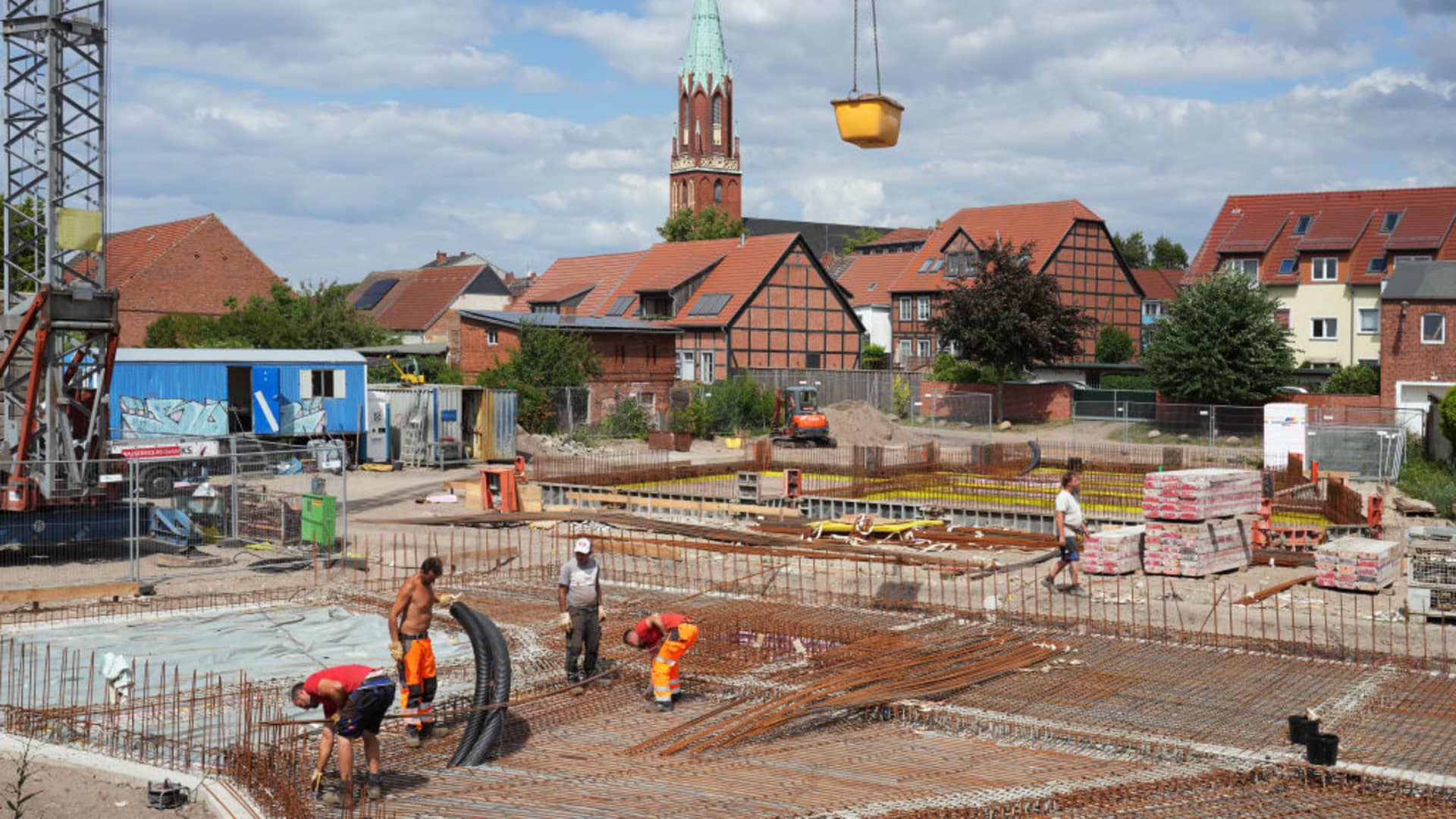Germany’s Olaf Scholz once set the goal of building 400,000 new homes a year, even before he become chancellor.
Fast forward two years, and German housebuilding looks like it’s collapsing, putting pressure on both his hard-to-reach goal, but also the overall economy of the country.
Companies are canceling residential construction projects, order numbers are shrinking and the outlook for the industry appears bleak, a report by the Ifo Institute for Economic Research published last week showed.
Over 22% of companies surveyed reported the cancellation of residential construction projects in Germany in October, a new record high. Meanwhile, 48.7% said there was a lack of orders — which compares to 46.6% in the previous month, and 18.7% a year earlier.
Expectations for the residential construction industry fell to what the Ifo described as an “exceptional low.” And this isn’t the only set of data that is raising concerns among onlookers.
The latest construction PMI survey for Germany by the Hamburg Commercial Bank fell to its lowest level in three and a half years at 38.3, which also marked a decline compared to September.
“Things continue to go from bad to worse in Germany’s construction sector. The housing sector is the epicentre of the downturn, nosediving at a breakneck speed,” Cyrus de la Rubia, chief economist at Hamburg Commercial Bank, said in a press release.
Elsewhere, building permits data also paints a weak picture. Between January and August, 28.3% less building permits were issued compared to the same timeframe in 2022, according to the German Federal Statistical Office.
Just 175,500 permits were issued in the first eight months of the year, the data shows, indicating that the government is on track to miss its goal of 400,000 new homes. Less than 250,000 are likely to be built this year, Carsten Brzeski, global head of macro research and chief economist for Germany at ING, told CNBC.
‘The first victim of higher interest rates’
Higher interest rates have been a key contributor to the downward trend in the sector, Brzeski said.
“The homebuilding or construction sector is the first victim of higher interest rates,” he said, pointing to increased costs of materials and energy, as well as overall financing costs being the key reasons for the collapse.
Much like many central banks around the world, the European Central Bank has been hiking interest rates in an effort to ease inflationary pressures. The ECB kept rates unchanged at 4% when it met last month, following a series of 10 consecutive increases.
Klaus Wohlrabe, head of Ifo surveys, said that cuts in housing construction subsidies have also added pressure, alongside higher rates and materials.
“Taking all three points together makes it impossible for many private consumers to build a house,” he told CNBC.
‘Bad news’ for the economy
And the current situation is only the beginning, according to the experts.
“The situation will worsen next year, when all order books are empty, developers are left with high cost projects and demand won’t pick up quickly enough,” Brzeski explained.
Wohlrabe agrees that 2024 could bring further difficulties.
“Currently many firms are relying on the backlog of orders. But the gap between current construction production and the incoming orders is widening. This means a drop in 2024 becomes more likely,” he said.
And with the construction industry being worth around 7% of Germany’s GDP, such a decline could put pressure on economic growth, he added.
This comes as concerns about the state of Germany’s economy have been piling on throughout the year after it fell into a technical recession in the first quarter of 2023. In its most recent forecast, the European Commission said it expected Germany’s economic activity to contract this year, before increasing again in 2024, even if at a lower level than previously anticipated.
But it’s also the jobs market that could be impacted by troubles in the homebuilding sector, Brzeski noted.
“It is a clear signal that what currently is a stagnating economy could easily become an economy in recession with rising unemployment,” he said.
Last week, the German federal government announced fresh measures that aim to speed up planning and permit processes for construction work and reduce red tape. Separately, it also announced financial relief for companies incurring high electricity costs.
But the experts are not fully convinced the measures will ease the housebuilding crisis Germany finds itself in, and neither Brzeski nor Wohlrabe see the measures as a clear solution.
While Brzeski believes the measures could at least help smooth the downswing, Wohlrabe is concerned that without key issues like financing costs being addressed, further long-term issues could develop.
If the crisis continues for too long, machinery and workforce capacities could be diminished, and would then be missing when the industry regains strength, Wohlrabe suggested, adding that this could then have a “dampening effect” overall.
